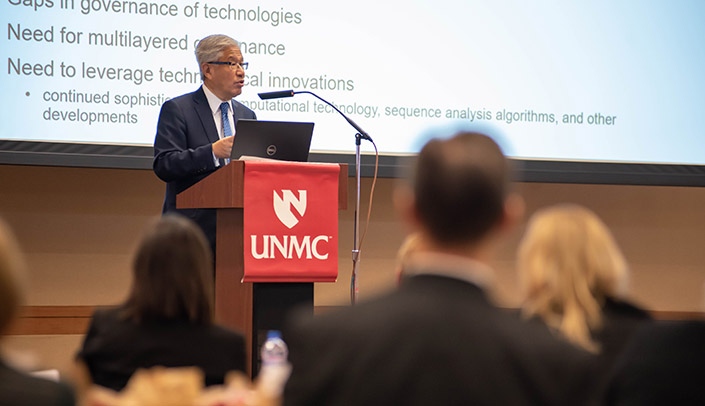Victor Dzau, M.D., president of the National Academy of Medicine, delivered the 33rd John S. Latta Lecture on April 18, speaking on “The Future of Health and Medicine: The Impact of Emerging Science and Innovation.”
Dr. Dzau’s message: That as technology rapidly advances, it is changing society and changing medicine.
He noted three revolutions in biomedical science since the mid-20th century — the discovery of DNA, the sequencing of the human genome and the convergence revolution — and noted that these parallel “an amazing digital revolution,” as well.
“These revolutions are converging and affecting so many parts of our lives,” he said, pointing to advances in biotechnology and biomedicine, regenerative medicine, cancer genomics, immunotherapy, big data and artificial intelligence.
The marriage of science and technology led to a challenge to cure, prevent and manage all disease by the end of the century, he said, adding that advances may make it possible to better understand patterns of health and disease, create more effective disease prediction and prevention and change the way (as well as where and how) care is delivered.
“There’s always a concern about how technology is moving and how can we catch up, if not get ahead, to be sure it’s not being misused,” Dr. Dzau said.
“There are many examples, because technology and science are moving at lightning speed, and it’s moving faster than our current societal and regulatory environment,” he said. “Think about the following: What does technology mean to cost of care? I’ve been around for a while, and every single amazing advance, people argue that it’s going to drive down the cost of care — even though it may be more expensive now, maybe it won’t be over time. I haven’t seen that yet.
“How do you make it affordable? How do people access? Would you actually aggravate the disparity you see in socio-economic populations? What’s the equity issue here?
“We have to address some of these fundamental issues to make it available to everyone.”
Dr. Dzau also serves as vice chair of the National Research Council. He is Chancellor Emeritus and James B. Duke Professor of Medicine at Duke University and the past president and CEO of the Duke University Health System. Previously, Dr. Dzau was the Hersey Professor of Theory and Practice of Medicine and chairman of medicine at Harvard Medical School’s Brigham and Women’s Hospital, as well as chairman of the department of medicine at Stanford University.
